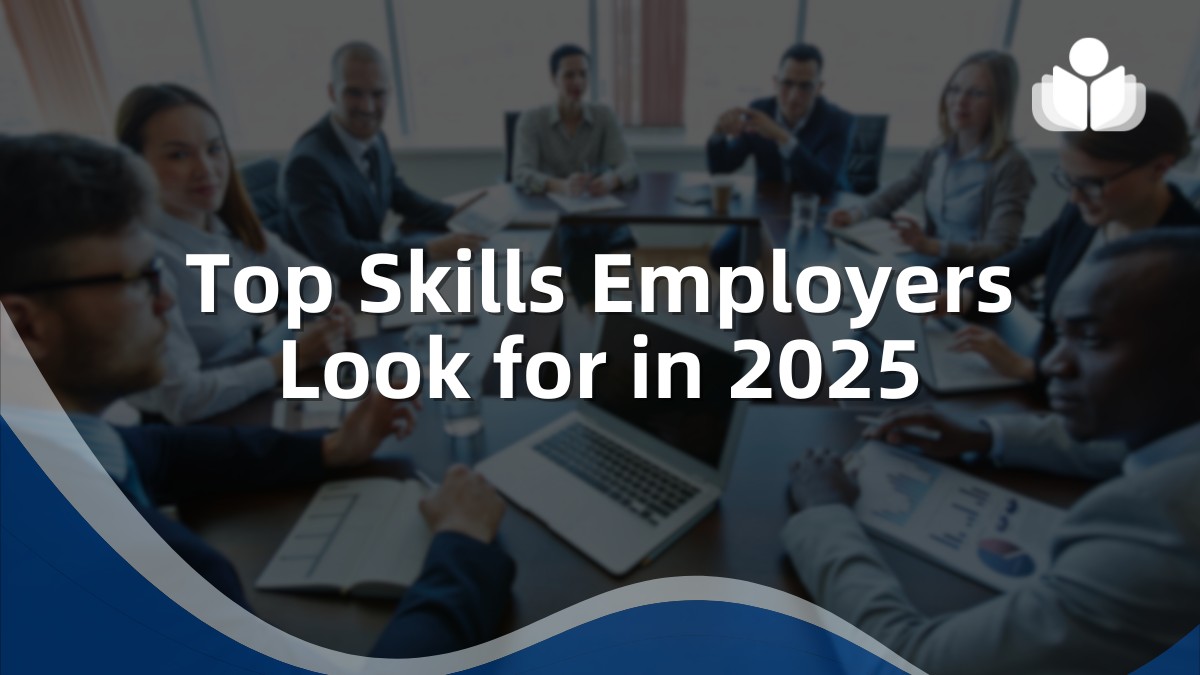In 2025, the job market will continue to evolve rapidly, driven by technological advancements and the lasting impacts of the post-pandemic world. Employers’ expectations have shifted, focusing more on remote and hybrid work environments, automation, and digital transformation.
As the landscape changes, technical and soft skills are becoming equally important. Beyond technical expertise, companies increasingly prioritize adaptability, communication, and collaboration to thrive in a more dynamic, digitally-driven workplace.
The demand for a workforce capable of navigating technological disruptions is growing, making it crucial for professionals to adapt and continually enhance their skills to remain competitive in this evolving environment.
Digital and Technological Literacy
The workplace is transforming significantly, with remote and hybrid work models becoming the norm. Automation, Artificial Intelligence (AI), and Machine Learning (ML) also redefine traditional job roles, replacing routine tasks with more strategic responsibilities. These changes are pushing professionals to upskill in digital literacy to meet employer demands.
Key Technical Skills Employers Seek
- Artificial Intelligence & Machine Learning: AI and data-driven decision-making have become essential in various industries. Employers seek individuals who can develop AI models, interpret machine learning outputs, and integrate these technologies into business processes to improve efficiency and innovation.
- Cloud Computing: As businesses continue to shift operations to the cloud, cloud computing skills are in high demand. Proficiency in platforms such as AWS, Microsoft Azure, and Google Cloud helps organizations manage data, enhance collaboration, and reduce IT infrastructure costs.
- Data Analysis & Data Science: Data analytics drives business insights and strategy. Companies seek professionals who can interpret large datasets to uncover trends, optimize processes, and make informed decisions.
- Cybersecurity: As more businesses digitize, the need for robust cybersecurity measures has increased. Protecting digital infrastructures from cyber threats has become a top priority, making cybersecurity expertise invaluable to companies looking to safeguard their operations.
Why Continuous Learning Is Essential
The rapid pace of technological advancements means that continuous learning is no longer optional but essential. Staying updated with emerging technologies ensures that professionals remain relevant in their fields.
Certifications, boot camps, and online learning platforms like Coursera and Udemy offer accessible ways to develop new skills and advance one’s career. Individuals can stay competitive in an increasingly technology-driven job market by continuously expanding their digital literacy.
Critical Thinking and Problem-Solving
In the modern workplace, employers need individuals who can approach complex problems with a mix of logic, creativity, and data analysis. As companies gather vast amounts of information, they require employees who can make data-driven decisions and think critically to solve issues in a rapidly changing environment.
Skills for Effective Problem-Solving
- Strategic Thinking: Tackling problems with long-term solutions in mind is a valuable asset in any organization. Strategic thinkers can anticipate challenges, develop forward-thinking plans, and contribute to sustainable business growth.
- Data Interpretation: The ability to interpret and analyze data is key to effective problem-solving. By identifying trends and insights, employees can inform decision-making processes and optimize business outcomes.
- Design Thinking: This creative problem-solving approach is widely used in product development and service improvement. It encourages teams to understand customer needs, prototype solutions, and iterate based on feedback, making it a valuable skill in today’s innovation-driven economy.
Real-World Applications
Critical thinking and problem-solving skills are applied across healthcare, technology, and finance industries. In healthcare, for example, professionals must make quick, data-driven decisions to improve patient outcomes.
Analytical thinking is necessary in finance to navigate complex financial models and optimize investment strategies. Companies value employees who can think critically and adapt to fast-changing environments, making these skills essential for success in 2025 and beyond.
Emotional Intelligence (EI) and Interpersonal Skills
Emotional Intelligence (EI) is the ability to recognize, understand, and manage our own emotions while also acknowledging and influencing the emotions of others. EI is essential for effective team collaboration, leadership, and building positive relationships in the workplace.
As companies increasingly value human-centered leadership, balancing technical ability with emotional intelligence is key to fostering an inclusive, productive environment.
Key EI Competencies
- Self-Awareness: Understanding your emotions and how they impact your actions and decisions. This self-reflection helps you manage stress and improve performance.
- Empathy: The ability to understand and share the feelings of others. Empathy enhances collaboration and fosters trust within teams.
- Conflict Resolution: Effectively managing and resolving disagreements by addressing issues constructively, creating a healthier team dynamic.
Impact on Workplace Culture
Emotional intelligence greatly influences workplace culture, enhancing teamwork, communication, and productivity. Leaders who prioritize EI help foster a supportive environment that values mental health and well-being.
With a greater focus on empathy and interpersonal skills, leaders can better address their teams’ emotional needs, creating a culture that promotes psychological safety and mutual respect.
Adaptability and Flexibility
In 2025, industries are evolving faster than ever due to technological advancements and globalization. To thrive in this rapidly changing landscape, professionals must be adaptable, open to change, eager to learn new skills, and comfortable in varying work environments.
Adaptability is now a critical trait employers seek, especially in dynamic industries like tech, healthcare, and marketing.
Skills to Demonstrate Adaptability
- Learning Agility: The ability to absorb and apply new information effectively in real-time situations is essential in fast-paced environments.
- Resilience: Maintaining productivity and a positive attitude in facing challenges or uncertainty.
- Cross-Functional Collaboration: Working across different departments or fields requires flexibility, broad knowledge, and effective communication.
Examples of Adaptability in Action
Adaptable employees thrive in sectors that require constant innovation, like technology, where trends and tools change frequently. Companies with flexible teams that embrace change, such as those adapting to remote work or shifting market demands, outperform less agile competitors by responding quickly to new opportunities.
Leadership and People Management
Leadership is moving from traditional, top-down models to more collaborative, distributed approaches. In 2025, effective leaders will focus on inspiring, mentoring, and guiding teams, especially in remote or hybrid work settings. Leadership from a distance while fostering trust and engagement will be crucial as organizations prioritize flexibility.
Key Leadership Skills
- Inclusive Leadership: Creating an environment where diverse perspectives are heard and valued fosters team members’ sense of belonging.
- Decision-Making Under Uncertainty: The ability to make well-informed decisions in ambiguous situations is essential, especially in rapidly changing industries.
- Coaching and Mentorship: Leaders who guide their teams’ growth and development through coaching and personalized feedback help build a more motivated and skilled workforce.
Leadership in a Tech-Driven World
In a technology-driven environment, leaders must balance the use of advanced tools with human-centered approaches. Effective leaders will understand new technologies’ potential and ensure that teams remain connected, motivated, and aligned with organizational goals.
The most successful leaders will leverage their technical understanding and interpersonal skills to lead teams in an era when technology and human behavior must work together.
Communication and Collaboration
In the digital age, clear and concise communication is vital for team success, especially across various platforms such as emails, virtual meetings, and collaboration tools. With the rise of remote work, asynchronous communication has become common, where team members contribute without needing to be online simultaneously. Mastering this style is key to maintaining productivity in a remote environment.
Key Communication Skills Employers Value
- Active Listening: Engaging with others’ perspectives fosters collaboration and understanding.
- Clarity in Written and Verbal Communication: Effectively conveying ideas ensures alignment and prevents team misunderstandings.
- Cross-Cultural Communication: Navigating cultural differences is essential as global teams become more common, requiring sensitivity and adaptability.
Collaboration in Remote and Hybrid Teams
Collaboration tools like Slack, Microsoft Teams, and Zoom allow remote teams to work cohesively. Successful collaboration fosters innovation, regardless of the physical location, and those who can navigate these tools effectively will thrive in hybrid work models.
Creativity and Innovation
Creativity drives problem-solving, product development, and innovation, making it a top skill for 2025. Innovation is critical to gaining a competitive advantage in tech, marketing, and design industries.
Fostering Creativity in the Workplace
- Innovation Mindset: Encouraging experimentation and thinking outside the box cultivates a creative work environment.
- Collaboration for Innovation: Diverse teams are more likely to generate creative solutions, combining different perspectives and experiences.
Companies like Apple and Tesla exemplify how creativity fuels innovation and business success. Their employees contribute to industry-leading products that disrupt markets.
Sustainability and Social Responsibility
Businesses increasingly prioritize sustainability and Corporate Social Responsibility (CSR) as part of their strategy. Environmental, Social, and Governance (ESG) criteria now influence business decisions, pushing companies to adopt sustainable practices.
Skills for Driving Sustainability
- Understanding Environmental Impact: Employees must stay informed about green technologies and sustainability trends.
- CSR Strategy Development: Aligning business objectives with societal and environmental goals is crucial for long-term impact.
- Stakeholder Engagement: Effective stakeholder communication regarding sustainability efforts strengthens an organization’s commitment to CSR.
Employers’ Focus on Social Responsibility
Companies like Patagonia and Unilever lead the way in sustainability, and employees play a pivotal role in driving these initiatives forward by advocating for positive change within their organizations.
Lifelong Learning and Growth Mindset
As technological and industry changes accelerate, employees must continuously learn and adapt. A growth mindset is open to new ideas, and personal development is crucial for thriving in this environment.
Skills for Continuous Learning
- Self-Directed Learning: Taking the initiative to acquire new skills through courses, certifications, and independent projects ensures career growth.
- Time Management for Learning: Balancing work responsibilities with personal development is key to long-term success.
How Employers Support Lifelong Learning
Many companies provide internal learning platforms, professional development programs, and mentorship opportunities to encourage continuous learning. These initiatives help employees stay relevant and equipped with up-to-date skills.
Conclusion
In 2025, the most in-demand skills will include digital literacy, critical thinking, emotional intelligence, adaptability, leadership, communication, creativity, sustainability, and a commitment to lifelong learning. These skills will be essential for navigating an evolving job market and contributing to organizational success.
To remain competitive, professionals must develop these critical skills while embracing continuous learning and adaptability. In a rapidly changing world, being proactive about personal and professional growth will ensure long-term career success and fulfillment.
 Sections of this topic
Sections of this topic
















